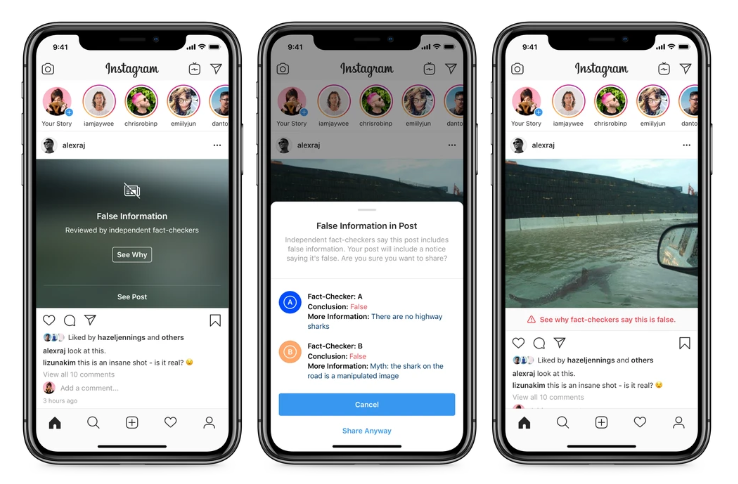



Instagram unveils fact-checking program to fight image-based misinformation
share on
Instagram has officially rolled out its fact-checking program globally to combat the increasing photo and video-based misinformation. The social media company first began working with third-party fact-checkers in the US in May of this year, to identify, review, and label false information.
According to Instagram, these partners assessed false information to reduce its distribution. With the global roll-out of the program, the company aims to allow other fact-checking organisations around the world to assess and rate misinformation on its platform. When content has been rated as false or party false by a third-party fact-checker, Instagram will reduce its distribution by removing it from the "Explore" and hashtag pages. In addition, these posts will also be labeled "false information" allowing users to identify which type of news and information to read, trust, and share. These labels will appear to all users around the world viewing that content, whether in feed, profile, stories, and/or direct messages.
According to Instagram, it used image matching technology to find further instances of such content and apply the label, in a bid to reduce the spread of misinformation. In addition, if something is rated false or partly false on Facebook, Instagram will automatically label identical content, and vice versa. The label will link out to the rating from the fact-checker and provide links to articles from credible sources that debunk the claim(s) made in the post.
"We make content from accounts that repeatedly receive these labels harder to find by removing it from Explore and hashtag pages. To determine which content should be sent to fact-checkers for review, we use a combination of feedback from our community and technology. Earlier this year, we added a “false information” feedback option, and these reports, along with other signals, help us to better identify and take action on potentially false information," Instagram said in a blog post.
Facebook has since been updating its platform and bolstering its other brands to cater to the needs of all users. Most recently, Facebook unveiled a new company logo to set the branding of the parent company apart from its social media app. The update seeks to reflect the company’s evolution from being a single social app to a provider of a suite of solutions such as Facebook app, Messenger, Instagram, WhatsApp, Oculus, Workplace, Portal and Calibra.
According to Facebook, the new brand system uses custom typography, rounded corners, open tracking and capitalisation to create visual distinction between the company and app. The logo is also designed to be responsive to its context and environment. Instead of owning a single colour, it will take on the colour of Facebook’s individual brands, creating a clearer relationship between the company and the products it builds.
Meanwhile, Instagram also introduced a dark mode option, which is a system-wide appearance that uses a darker colour palette for all screens, views, menus, and controls. According to Apple’s iOS guidelines, the dark mode option uses more vibrancy to make foreground content stand out against the darker backgrounds.
Read more:
FB to integrate Instagram, Messenger and WhatsApp: A cure to fragmentation?
Instagram’s move into long-form content: Will the IGTV app dethrone YouTube?
Deleting texts on FB Messenger is now possible, but should brands do it?
Is your hashtag really increasing your engagement on Instagram?
Could Facebook’s latest renaming effort prove a double-edged sword in the long run?
Mark Zuckerberg experiments with live-streaming unscripted internal Q&As
Facebook CEO defends ‘free expression’ after Twitter CEO enforces political ad ban
Will Facebook’s removal of iconic ‘Like’ button result in more of your ad dollars spent?
Facebook unveils 3 ad solutions to encourage ‘playful experiences’
Facebook lists structure of Oversight Board to oversee content decisions
Facebook latest to hide vanity metrics, after Instagram, YouTube and Twitter
Facebook shuts location apps for privacy violation: First steps in cleaning up its act?
share on
Free newsletter
Get the daily lowdown on Asia's top marketing stories.
We break down the big and messy topics of the day so you're updated on the most important developments in Asia's marketing development – for free.
subscribe now open in new window

